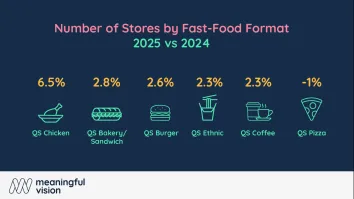
How to effectively recruit in a digital generation: elementsuite
Today more than ever, the hospitality sector is struggling to recruit - with UK unemployment at a near 40-year historic low.
Historically, the sector has had high staff turnover but in a time where the nation has fallen back in love with food, and with numbers soaring for customers dining out or ordering takeaways, it is crucial to attract and employ the right teams.
Steve Elcock, CEO of elementsuite, the HR and workforce management platform, discusses how operators can effectively recruit in a digital generation.
Lowering the bar
The recruitment process of old meant applicants were tasked with filling in a lot of forms detailing why they are right for this role, what skills they would bring etc. and this allowed employers to paint a full picture of the type of employee they may be – all at stage one. However, these days the process has been sped up quite significantly with applicants now heading to job boards or company websites and tasked with providing as little as a name and email address to get the recruitment process started.
The industry is making it easier to apply, in an aim of getting people through the door. This shift is down to a lack of demand for the advertised roles, which has resulted in operators being unable to filter the unsuitable candidates at a much later stage. There are ways to make the process better.
Employee Screening
This process has seen the biggest change in past few years, we are seeing more operators adopt a video screening process, which enables prospective candidates to provide a piece to camera job application. The benefits of this for employers is that they get a sense of the character behind the application, furthermore it allows them to see if the candidate will be a good cultural fit. Previously, the traditional CV only provided operators with a one-dimensional view of a person - a brief overview, job history and education.
However, video demonstrates their personality and confidence which allows the employee to really convey what makes them right for the job and in turn allows the operator to see the person behind the words – this is crucial in the hospitability sector. However, this process doesn’t come without its pitfalls. A video screening method does mean that it is harder to prove process-fairness and could open operators up to questions on why they did not employee someone i.e. was it based on age, gender etc.
Behaviour Screening
Once an employee gets past the first round of recruitment, it is important for operators to ensure they are up for the challenge. We are seeing more operators incorporate Video behaviour screening into their recruitment process, as this offers a more interactive session for the candidate and will involve them watching a scenario playout on screen i.e. a challenging customer, they will then be questioned on how they would respond to the situation. This method allows the recruiter to see how the prospective employee will deal with an on-the-ground situation.
Intelligent Recruiting
A single software platform like ours that joins up Recruitment with HR and Workforce Management allows operators to manage their recruitment more intelligently. It provides real-time data that can inform recruiting decisions. For example the system allows an operator to see which shifts/sites are consistently under staffed, enabling the HR team to better target recruitment and solve on-site specific issues. The system also helps to close the organisational loop, allowing senior teams to better communicate with the front line to provide the information needed when making recruiting decisions. The data then goes one step further and can provide demographics and skills shortages etc. which then lets the operator plug gaps where required.
Engagement
Keeping the employees engaged is the number one priority for operators, we have seen some of our clients report that they have cut staff turnover by half, over the course of two years which was driven by keeping their staff engaged. Implying that not only does this benefit the retention levels but the bottom line too. With the GDPR regulations coming into force in a few weeks, we do expect to see a significant impact on the number of employees available within the sector as many will opt out of being contacted, which will result in employers unable to contact past employees to recommend suitable jobs. Forward looking companies will take the learning’s from employee engagement and seek ways to better connect and keep in touch with Candidates and Leavers – building and nurturing a pool of prospective applicants.
The workforce is continually changing so it is important that operators adopt new methods of recruitment to ensure they are reaching as many suitable candidates as possible. Once the initial recruitment stage ends and they transition to become an employee it is important that they remain engaged and happy within their roles to avoid high turnover rates. The new technologies available today provides operators with an opportunity to not only better target employees but to also find the best candidate for the job. Therefore it is vital that they take advantage of new opportunities to keep up with the ever-changing digital generation.

























